备考2011高效学习方案英语高一册:unit 15 the necklace
文档属性
| 名称 | 备考2011高效学习方案英语高一册:unit 15 the necklace |
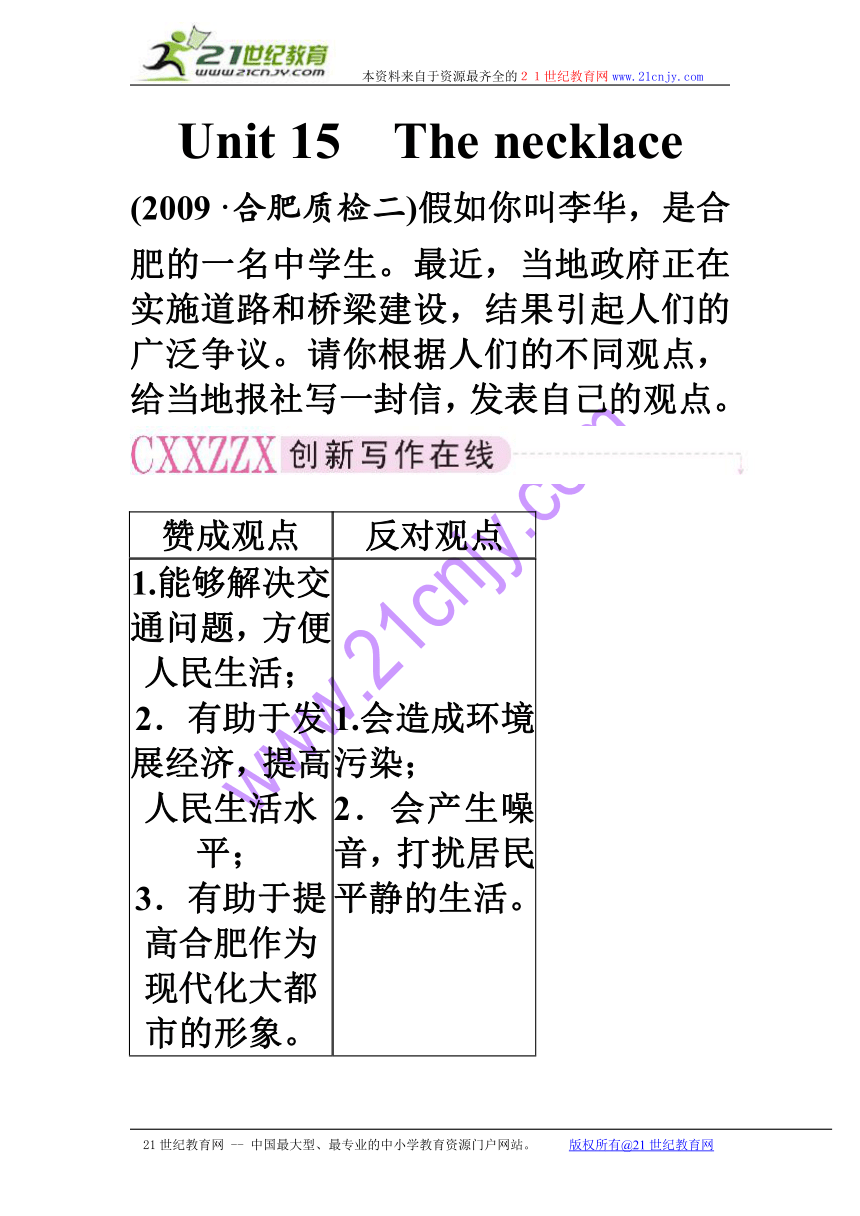
|
|
| 格式 | rar | ||
| 文件大小 | 132.4KB | ||
| 资源类型 | 教案 | ||
| 版本资源 | 人教版 | ||
| 科目 | 英语 | ||
| 更新时间 | 2010-12-14 00:00:00 | ||
图片预览

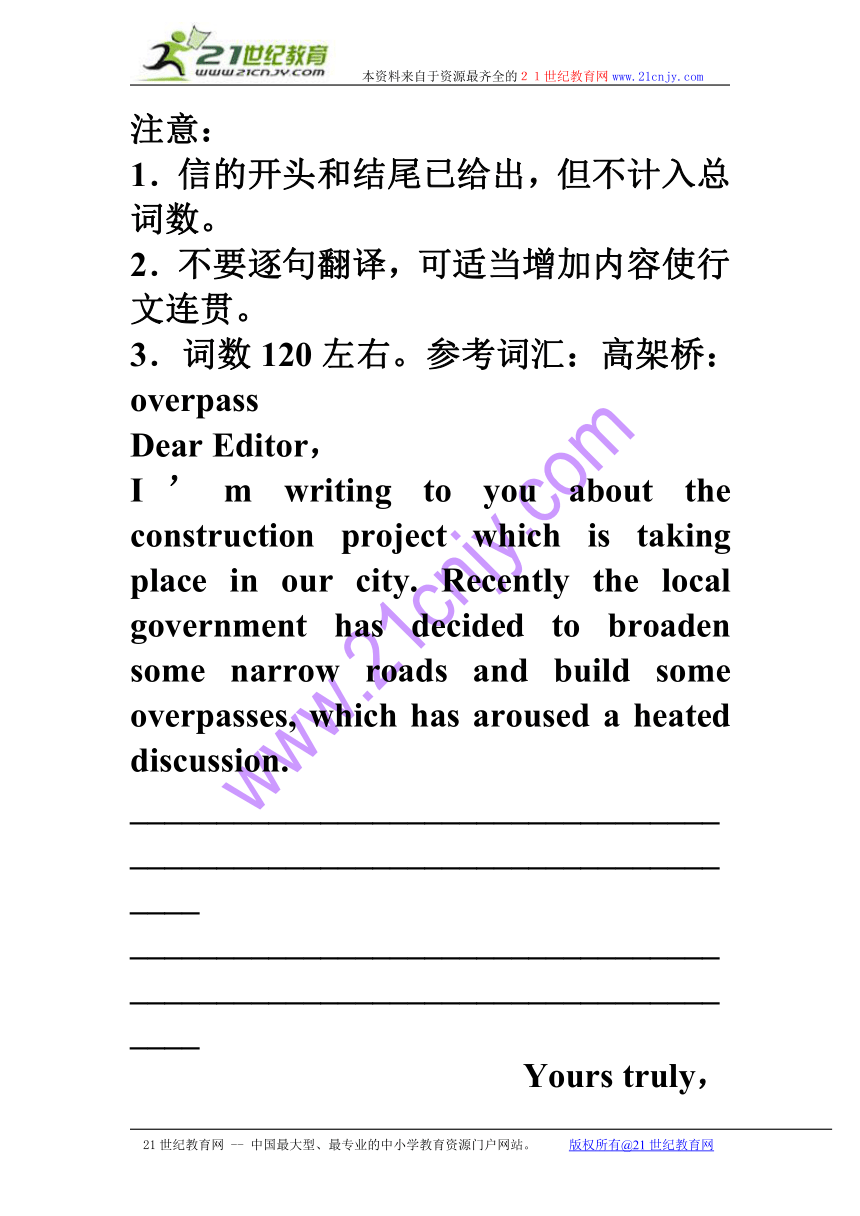
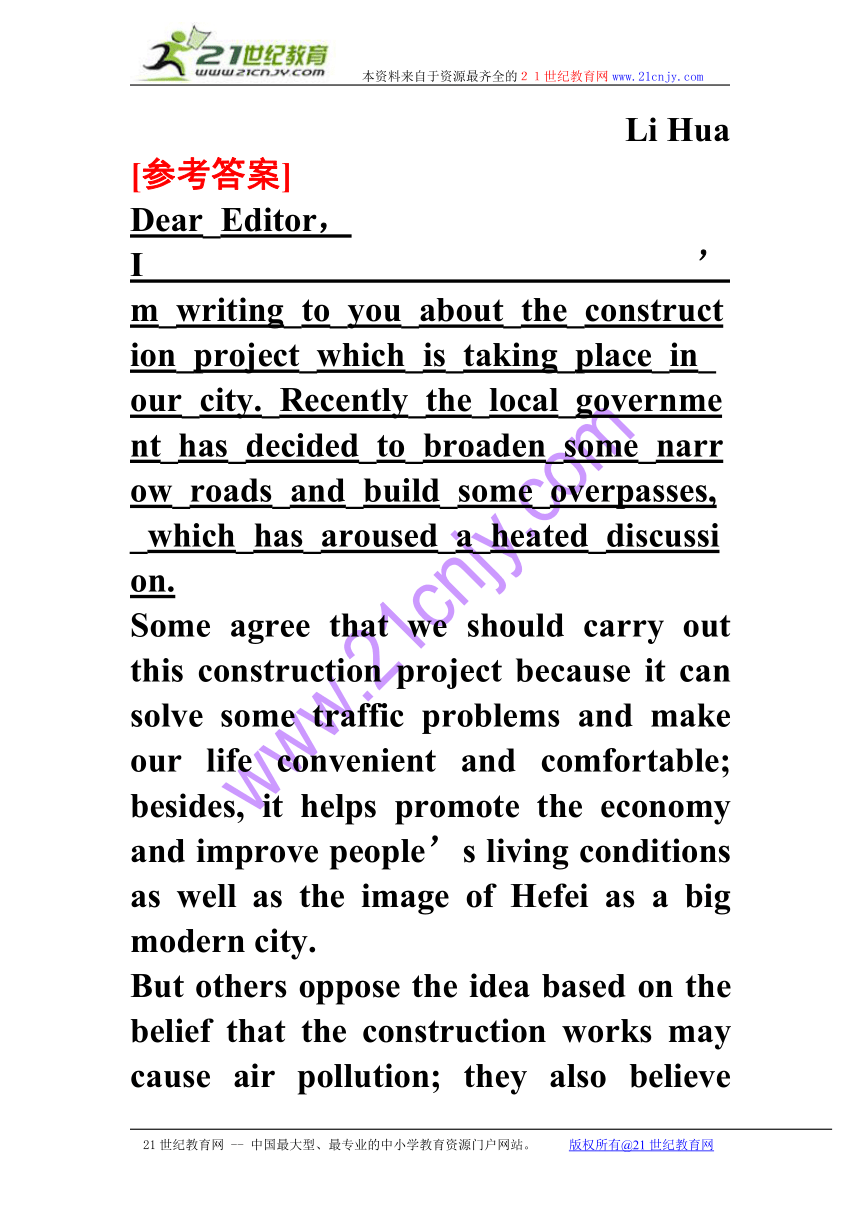
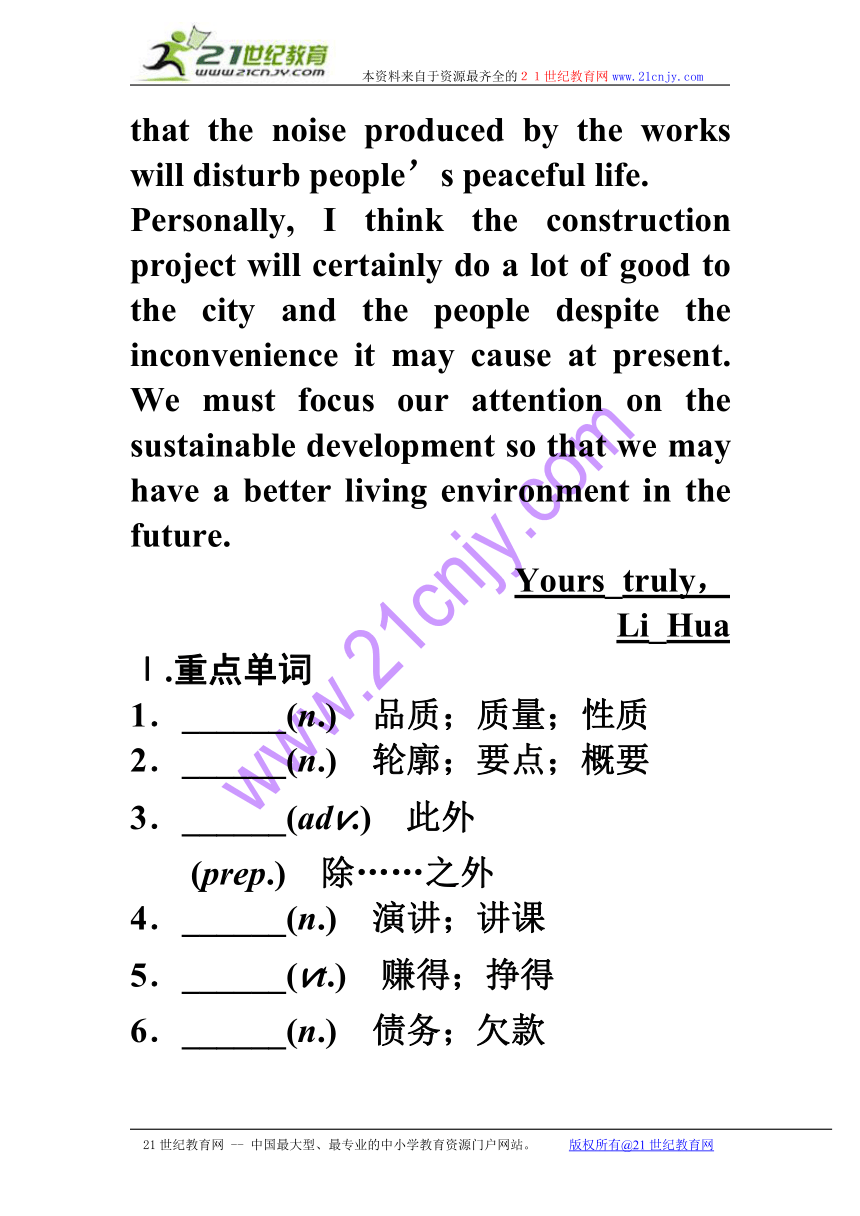
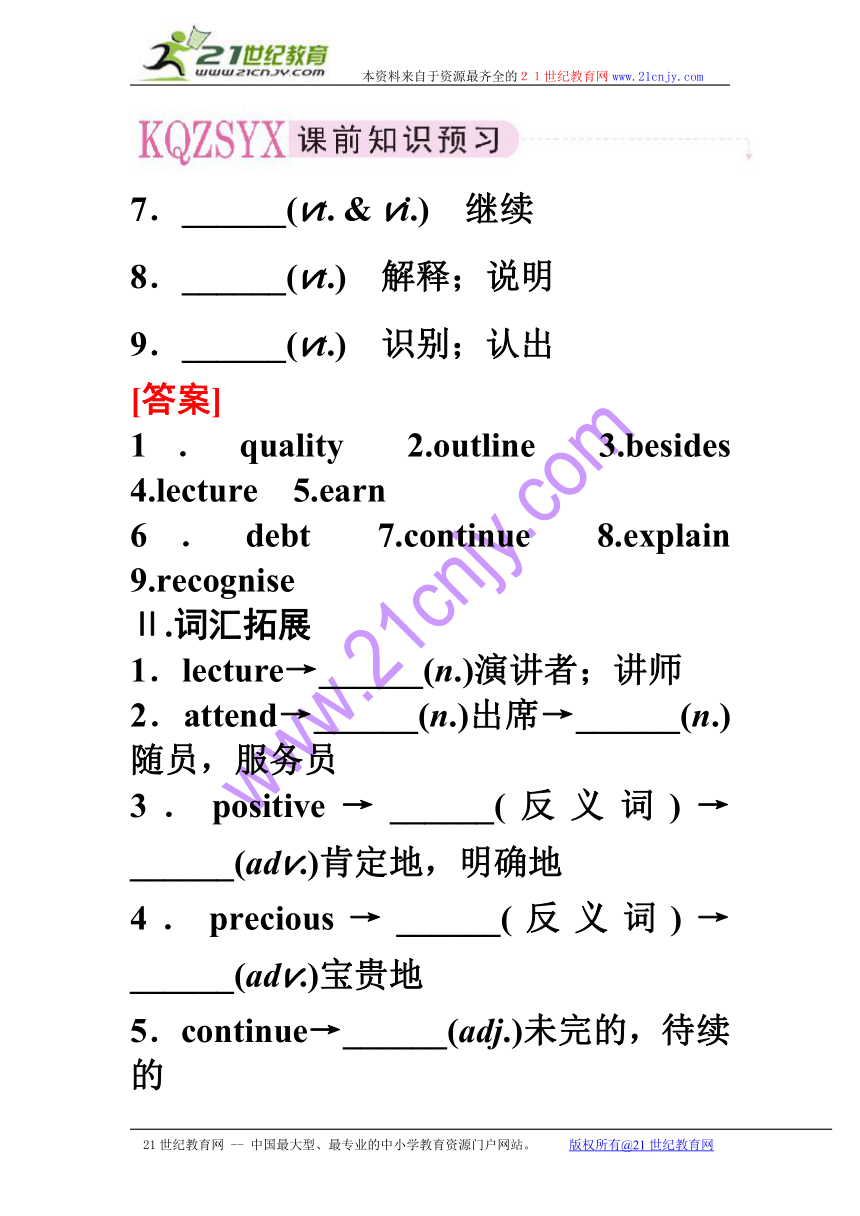
文档简介
本资料来自于资源最齐全的21世纪教育网www.21cnjy.com
Unit 15 The necklace
(2009·合肥质检二)假如你叫李华,是合肥的一名中学生。最近,当地政府正在实施道路和桥梁建设,结果引起人们的广泛争议。请你根据人们的不同观点,给当地报社写一封信,发表自己的观点。
赞成观点 反对观点
1.能够解决交通问题,方便人民生活;2.有助于发展经济,提高人民生活水平;3.有助于提高合肥作为现代化大都市的形象。 1.会造成环境污染;2.会产生噪音,打扰居民平静的生活。
注意:
1.信的开头和结尾已给出,但不计入总词数。
2.不要逐句翻译,可适当增加内容使行文连贯。
3.词数120左右。参考词汇:高架桥:overpass
Dear Editor,
I’m writing to you about the construction project which is taking place in our city. Recently the local government has decided to broaden some narrow roads and build some overpasses, which has aroused a heated discussion.
________________________________________________________________________
________________________________________________________________________
Yours truly,
Li Hua
[参考答案]
Dear_Editor,
I’m_writing_to_you_about_the_construction_project_which_is_taking_place_in_our_city._Recently_the_local_government_has_decided_to_broaden_some_narrow_roads_and_build_some_overpasses,_which_has_aroused_a_heated_discussion.
Some agree that we should carry out this construction project because it can solve some traffic problems and make our life convenient and comfortable; besides, it helps promote the economy and improve people’s living conditions as well as the image of Hefei as a big modern city.
But others oppose the idea based on the belief that the construction works may cause air pollution; they also believe that the noise produced by the works will disturb people’s peaceful life.
Personally, I think the construction project will certainly do a lot of good to the city and the people despite the inconvenience it may cause at present. We must focus our attention on the sustainable development so that we may have a better living environment in the future.
Yours_truly,
Li_Hua
Ⅰ.重点单词
1.______(n.) 品质;质量;性质
2.______(n.) 轮廓;要点;概要
3.______(adv.) 此外
(prep.) 除……之外
4.______(n.) 演讲;讲课
5.______(vt.) 赚得;挣得
6.______(n.) 债务;欠款
7.______(vt. & vi.) 继续
8.______(vt.) 解释;说明
9.______(vt.) 识别;认出
[答案]
1.quality 2.outline 3.besides 4.lecture 5.earn
6.debt 7.continue 8.explain 9.recognise
Ⅱ.词汇拓展
1.lecture→______(n.)演讲者;讲师
2.attend→______(n.)出席→______(n.)随员,服务员
3.positive→______(反义词)→______(adv.)肯定地,明确地
4.precious→______(反义词)→______(adv.)宝贵地
5.continue→______(adj.)未完的,待续的
6.explain→______(n.)解释;说明
7.scary→______(同义词)→______(v.)惊吓,威吓
8.activist→______(adj.)活跃的,积极的→______(v.)使活动
[答案]
1.lecturer 2.attendance; attendant 3.negative; positively
4.worthless; preciously 5.continued 6.explanation
7.terrifying/frightening; scare 8.active; activate
Ⅲ.重点短语
1.come up ______ 找到(答案)
2.look ______ 低头看
3.be made ______ 由……制成
4.because ______ 因为
5.know ______ 很了解……
6.bring ______ 拿出
7.______ jewellery 戴珠宝
8.______ out 把……表演出来;把……付
诸行动
9.______ most 至多
10.pay ______ 还清(债务等);付清
11.day ______ night 日日夜夜地
12.bring ______ 拿回来;使恢复
13.call ______ 访问;号召
[答案]
1.with 2.down 3.of 4.of 5.well 6.out 7.wear
8.act 9.at 10.off 11.and 12.back 13.on
Ⅳ.重点句型
1.I would rather not do...我宁愿不做……
2.I saw a lovely diamond necklace with a big blue stone in the centre.
我看到一串中心处镶嵌着钻石的漂亮项链。
3.I don’t think I know you.我想我不认识你。
4.What about...?……怎么样?
Ⅴ.重点语法
情态动词can/could, may/might的用法
Ⅰ.词汇聚焦
1.recognize v. 识别;认出
[思维拓展]
①recognize sb.认出某人
recognize one’s voice听出某人的声音
recognize the problem认清问题
recognize...as...认定;承认……为……
②recognition n. 认出;公认
beyond/out of all recognition 面目全非
in recognition of...作为对……的感谢
He was ______ as the pioneer of the new field.
A. made B. realized
C. recognized D. thought
解析:make接双宾语;realize“认识到”;think sb. to be...“认为某人是……”;recognize...as...“认定;承认是……”。
答案:C
2.earn n. 赚得;挣得
[思维拓展]
earn money (=make money)赚钱,挣钱
earn $1,000 a month (=make $1,000 a month)
每月挣1千美元
earn one’s living by (=make a living by=live by)
靠……谋生,靠……维持生计
earn one’s confidence/respect赢得某人的信任/尊敬
earning n. 收入(常用复数)
He can ______ 3,000 yuan a month by writing stories and support a family of three.
A. spare B. afford
C. earn D. charge
解析:earn money by doing的意思是“通过做……赚钱”;spare money的意思是“节省钱”;afford money的意思是“能付得起钱”;charge money的意思是“收钱”。
答案:C
3.attend vt. 出席,参加(=be present at)
[思维拓展]
attend a meeting/conference参加会议
attend a lecture听演讲
attend school/classes上学/听课
v. 照顾,看护,服侍
attend(on/upon) the sick看护病人
attend to a customer接待顾客
vi. 注意;专心于
attend to专心于
[指点迷津]
①attend正式用语,参加严肃的活动,如会议、听课、演讲。
②join加入某一组织,成为其中成员。
③join (sb.) in sth./doing和某人一起进行一项具体的活动,多指正在进行的活动。
④take part in参加活动,是一般用语。
—Would you like to ______ us in celebrating John’s return from Africa tonight
—I’d like to, but I have to ______ a meeting.
A. join; attend B. attend; join
C. take part in; attend D. join; join in
解析:join us in celebrating John’s return“和我们一起庆祝约翰的归来”;attend a meeting“参加会议”。
答案:A
Ⅱ.短语突破
1.be worth值……
[思维拓展]
be worth doing值得做……
be worth+n. (表示钱数、价值)
be worthy to be done值得做……
be worthy of being done值得做……
be worthy of+n. (表动作的名词)
be worth (one’s) while to do/doing sth.值得做……
[指点迷津]
①be worth doing sth.中doing必须是vt.,否则需加介词。如:
The matter isn’t worth worrying about.
②worth和worthy都用well修饰而不用very。
It is said that the film is ______ seeing.
A. very worth B. quite worthy of
C. well worth D. rather worthy of
解析:只有be worth的后面跟doing,用主动形式表示被动意义;且worth应用well来修饰,不用very。
答案:C
2.call on 访问;号召;邀请
[思维拓展]
①call on sb.拜访某人
call at sp.拜访某地
②drop in on sb.顺便拜访某人
drop in at sp.顺便拜访某地
③visit sb./sp.(=pay a visit to sb./sp.; be on a visit to sb./sp.)参观某地,访问某人
④call on sb. to do sth.号召某人干某事
call up (=ring up)打电话;使人想起
call for需要;约请
call in叫某人进来;召集
[指点迷津]
call on的宾语为人;call at的宾语为地点。
Old memories are often ______ when you hear a particular song or a piece of music.
A. called in B. called on
C. called out D. called up
解析:call up意为“使人想起;打电话”;call on“号召;拜访某人”;call out“出动;唤起;引起;大声叫出来”;call in“收回;请来”。根据句意,答案为call up。
答案:D
3.at most至多
[思维拓展]
at (the) most至多;不超过
at (the) least至少;不低于
at (the) best充其量不超过
[指点迷津]
①at least与数字连用时,相当于not less than“至少”。
②at least还可表程度,意为“反正,无论如何”。
③at most与数字连用时,相当于not more than“至多”。
—Why not join us
—I can not. ______ I would rather not. I am not well enough.
A. At last B. At once
C. At most D. At least
解析:答语为:我不能,无论如何我不愿意,我身体不舒服。显然,空白处的短语表示程度。
答案:D
4.pay off还清(债务等);付清
[思维拓展]
pay sb. for因……给某人报酬
pay some money for付……的钱
pay sb. some money for因……付给某人多少钱
pay for付……的钱
pay back偿还(借款等);报答
After three years of hard work, they had at last paid ______ all the money they had borrowed.
A. for B. out
C. in D. back
解析:根据句子的意义“三年的艰苦劳动之后,他们终于把借的钱还上了。”可知,答案为pay back。
答案:D
5.bring back拿回来;使恢复
[思维拓展]
bring about引起;致使;造成
bring down击落;射杀;降低
bring in获利,赚;引进,推广;收割,收获
bring out生产;制造
bring up养育,教养;(俗)呕吐
bring oneself to奋力;下决心
bring sb./sth. under control控制某人/某物
bring on引起;导致
The Beatles singing “Yesterday” ______ memories whenever we hear it.
A. brings back B. brings down
C. brings out D. brings up
解析:句意:披头士唱的“昨天”这首歌我们无论什么时候听都叫人回忆起往事。
答案:A
6.after all毕竟;终究
[思维拓展]
after all句首表强调,“毕竟,要知道”;句末表转折,“虽然……但终究”。
in all (=altogether)总计
all over到处
all along一直,始终
above all首先,最为重要的是
at all根本,全然
There aren’t so many factories in this area. It has been developed for such a short time ______.
A. at all B. in all
C. for all D. after all
解析:at all“根本,全然”;in all“总共,全部”;for all“为了所有的”;after all“毕竟,终究”。根据句意,应选择after all。
答案:D
7.would rather宁愿
[思维拓展]
①would rather (not) do宁愿(不)做……
would rather do...than do宁愿做……不愿做
would do...rather than do宁愿做……不愿做
②would rather后可接宾语从句,须用虚拟语气,表示现在或将来的情况用一般过去时态;表示过去的情况用过去完成时态。
—Would you mind if I used your computer for a little while
—______.
A. No, please don’t
B. I’d rather you didn’t
C. I’m afraid not
D. Sure, it’s my pleasure
解析:该题是一个语境题目。A项答语本身前后矛盾;C项不符合说话人的语言习惯;D项也不合适。would rather后的从句需用虚拟语气,用过去式表示对现在的虚拟。
答案:B
Ⅲ.句型归纳
1.I’ll go and see her on Friday after I get the new dress.有了新礼服之后,我星期五就去看她。
[指点迷津]
句中after引导时间状语从句,从句用一般现在时表示将来。在时间状语从句和条件状语从句中,将来时态用一般现在时来表示。如:I don’t know if he will come tomorrow; if he comes, I will tell you.
If you go to his party tomorrow, so will I.
另外,根据时刻表进行的动作同样用一般现在时表示将来。如:
The plane that Mr. Smith will take leaves at 10 o’clock tomorrow.
If you go to his party tomorrow, so will I.
另外,根据时刻表进行的动作同样用一般现在时表示将来。如:
The plane that Mr. Smith will take leaves at 10 o’clock tomorrow.
Come and see me whenever ______.
A. you are convenient
B. you will be convenient
C. it is convenient to you
D. it will be convenient to you
解析:whenever引导的是时间状语从句,应用一般现在时表示将来,排除B、D两项;convenient“方便的”,主语应为物。
答案:C
2.That’s why I now look so old.这就是我为什么看起来这么老。
[思维拓展]
①That’s why...“这就是为什么……”
That’s because...“这是因为……”
②The reason why/for which...+is that...“为什么……的原因是……”
—I drove to Zhuhai for the air show last week.
—Is that ______ you had a few days off
A. why B. when
C. what D. where
解析:用why引导表语从句并在从句中作原因状语;其余各项不符合语境。
答案:A
3.Do you remember one afternoon ten years ago when I came to your house and borrowed a necklace of yours?10年前的一个下午,我到你家借过一条项链,你还记得吗?
[思维拓展]
句中由关系副词when引导的定语从句修饰先行词one afternoon。ten years ago是定语,也修饰one afternoon。
一般来讲,定语从句总是紧跟着它所修饰的先行词的。但有时候定语从句与先行词之间被其他成分分隔开来,这种定语从句叫作分隔式定语从句。又如:
The days are gone when we suffered so much.以前那种受苦受难的日子已经过去了。(定语从句与先行词之间被谓语are gone隔开)
There are thousands of stars in the sky that are like our sun.天空中有成千上万颗像太阳一样的恒星。(定语从句与先行词之间被状语in the sky隔开)。
The film brought the hours back to me ______ I was taken good care of in the faraway village.
A. until B. that
C. when D. where
解析:本句是一个分隔式定语从句。back to me把先行词the hours和定语从句分开了且先行词在定语从句中作时间状语,故答案为when。
答案:C
21世纪教育网 -- 中国最大型、最专业的中小学教育资源门户网站。 版权所有@21世纪教育网
Unit 15 The necklace
(2009·合肥质检二)假如你叫李华,是合肥的一名中学生。最近,当地政府正在实施道路和桥梁建设,结果引起人们的广泛争议。请你根据人们的不同观点,给当地报社写一封信,发表自己的观点。
赞成观点 反对观点
1.能够解决交通问题,方便人民生活;2.有助于发展经济,提高人民生活水平;3.有助于提高合肥作为现代化大都市的形象。 1.会造成环境污染;2.会产生噪音,打扰居民平静的生活。
注意:
1.信的开头和结尾已给出,但不计入总词数。
2.不要逐句翻译,可适当增加内容使行文连贯。
3.词数120左右。参考词汇:高架桥:overpass
Dear Editor,
I’m writing to you about the construction project which is taking place in our city. Recently the local government has decided to broaden some narrow roads and build some overpasses, which has aroused a heated discussion.
________________________________________________________________________
________________________________________________________________________
Yours truly,
Li Hua
[参考答案]
Dear_Editor,
I’m_writing_to_you_about_the_construction_project_which_is_taking_place_in_our_city._Recently_the_local_government_has_decided_to_broaden_some_narrow_roads_and_build_some_overpasses,_which_has_aroused_a_heated_discussion.
Some agree that we should carry out this construction project because it can solve some traffic problems and make our life convenient and comfortable; besides, it helps promote the economy and improve people’s living conditions as well as the image of Hefei as a big modern city.
But others oppose the idea based on the belief that the construction works may cause air pollution; they also believe that the noise produced by the works will disturb people’s peaceful life.
Personally, I think the construction project will certainly do a lot of good to the city and the people despite the inconvenience it may cause at present. We must focus our attention on the sustainable development so that we may have a better living environment in the future.
Yours_truly,
Li_Hua
Ⅰ.重点单词
1.______(n.) 品质;质量;性质
2.______(n.) 轮廓;要点;概要
3.______(adv.) 此外
(prep.) 除……之外
4.______(n.) 演讲;讲课
5.______(vt.) 赚得;挣得
6.______(n.) 债务;欠款
7.______(vt. & vi.) 继续
8.______(vt.) 解释;说明
9.______(vt.) 识别;认出
[答案]
1.quality 2.outline 3.besides 4.lecture 5.earn
6.debt 7.continue 8.explain 9.recognise
Ⅱ.词汇拓展
1.lecture→______(n.)演讲者;讲师
2.attend→______(n.)出席→______(n.)随员,服务员
3.positive→______(反义词)→______(adv.)肯定地,明确地
4.precious→______(反义词)→______(adv.)宝贵地
5.continue→______(adj.)未完的,待续的
6.explain→______(n.)解释;说明
7.scary→______(同义词)→______(v.)惊吓,威吓
8.activist→______(adj.)活跃的,积极的→______(v.)使活动
[答案]
1.lecturer 2.attendance; attendant 3.negative; positively
4.worthless; preciously 5.continued 6.explanation
7.terrifying/frightening; scare 8.active; activate
Ⅲ.重点短语
1.come up ______ 找到(答案)
2.look ______ 低头看
3.be made ______ 由……制成
4.because ______ 因为
5.know ______ 很了解……
6.bring ______ 拿出
7.______ jewellery 戴珠宝
8.______ out 把……表演出来;把……付
诸行动
9.______ most 至多
10.pay ______ 还清(债务等);付清
11.day ______ night 日日夜夜地
12.bring ______ 拿回来;使恢复
13.call ______ 访问;号召
[答案]
1.with 2.down 3.of 4.of 5.well 6.out 7.wear
8.act 9.at 10.off 11.and 12.back 13.on
Ⅳ.重点句型
1.I would rather not do...我宁愿不做……
2.I saw a lovely diamond necklace with a big blue stone in the centre.
我看到一串中心处镶嵌着钻石的漂亮项链。
3.I don’t think I know you.我想我不认识你。
4.What about...?……怎么样?
Ⅴ.重点语法
情态动词can/could, may/might的用法
Ⅰ.词汇聚焦
1.recognize v. 识别;认出
[思维拓展]
①recognize sb.认出某人
recognize one’s voice听出某人的声音
recognize the problem认清问题
recognize...as...认定;承认……为……
②recognition n. 认出;公认
beyond/out of all recognition 面目全非
in recognition of...作为对……的感谢
He was ______ as the pioneer of the new field.
A. made B. realized
C. recognized D. thought
解析:make接双宾语;realize“认识到”;think sb. to be...“认为某人是……”;recognize...as...“认定;承认是……”。
答案:C
2.earn n. 赚得;挣得
[思维拓展]
earn money (=make money)赚钱,挣钱
earn $1,000 a month (=make $1,000 a month)
每月挣1千美元
earn one’s living by (=make a living by=live by)
靠……谋生,靠……维持生计
earn one’s confidence/respect赢得某人的信任/尊敬
earning n. 收入(常用复数)
He can ______ 3,000 yuan a month by writing stories and support a family of three.
A. spare B. afford
C. earn D. charge
解析:earn money by doing的意思是“通过做……赚钱”;spare money的意思是“节省钱”;afford money的意思是“能付得起钱”;charge money的意思是“收钱”。
答案:C
3.attend vt. 出席,参加(=be present at)
[思维拓展]
attend a meeting/conference参加会议
attend a lecture听演讲
attend school/classes上学/听课
v. 照顾,看护,服侍
attend(on/upon) the sick看护病人
attend to a customer接待顾客
vi. 注意;专心于
attend to专心于
[指点迷津]
①attend正式用语,参加严肃的活动,如会议、听课、演讲。
②join加入某一组织,成为其中成员。
③join (sb.) in sth./doing和某人一起进行一项具体的活动,多指正在进行的活动。
④take part in参加活动,是一般用语。
—Would you like to ______ us in celebrating John’s return from Africa tonight
—I’d like to, but I have to ______ a meeting.
A. join; attend B. attend; join
C. take part in; attend D. join; join in
解析:join us in celebrating John’s return“和我们一起庆祝约翰的归来”;attend a meeting“参加会议”。
答案:A
Ⅱ.短语突破
1.be worth值……
[思维拓展]
be worth doing值得做……
be worth+n. (表示钱数、价值)
be worthy to be done值得做……
be worthy of being done值得做……
be worthy of+n. (表动作的名词)
be worth (one’s) while to do/doing sth.值得做……
[指点迷津]
①be worth doing sth.中doing必须是vt.,否则需加介词。如:
The matter isn’t worth worrying about.
②worth和worthy都用well修饰而不用very。
It is said that the film is ______ seeing.
A. very worth B. quite worthy of
C. well worth D. rather worthy of
解析:只有be worth的后面跟doing,用主动形式表示被动意义;且worth应用well来修饰,不用very。
答案:C
2.call on 访问;号召;邀请
[思维拓展]
①call on sb.拜访某人
call at sp.拜访某地
②drop in on sb.顺便拜访某人
drop in at sp.顺便拜访某地
③visit sb./sp.(=pay a visit to sb./sp.; be on a visit to sb./sp.)参观某地,访问某人
④call on sb. to do sth.号召某人干某事
call up (=ring up)打电话;使人想起
call for需要;约请
call in叫某人进来;召集
[指点迷津]
call on的宾语为人;call at的宾语为地点。
Old memories are often ______ when you hear a particular song or a piece of music.
A. called in B. called on
C. called out D. called up
解析:call up意为“使人想起;打电话”;call on“号召;拜访某人”;call out“出动;唤起;引起;大声叫出来”;call in“收回;请来”。根据句意,答案为call up。
答案:D
3.at most至多
[思维拓展]
at (the) most至多;不超过
at (the) least至少;不低于
at (the) best充其量不超过
[指点迷津]
①at least与数字连用时,相当于not less than“至少”。
②at least还可表程度,意为“反正,无论如何”。
③at most与数字连用时,相当于not more than“至多”。
—Why not join us
—I can not. ______ I would rather not. I am not well enough.
A. At last B. At once
C. At most D. At least
解析:答语为:我不能,无论如何我不愿意,我身体不舒服。显然,空白处的短语表示程度。
答案:D
4.pay off还清(债务等);付清
[思维拓展]
pay sb. for因……给某人报酬
pay some money for付……的钱
pay sb. some money for因……付给某人多少钱
pay for付……的钱
pay back偿还(借款等);报答
After three years of hard work, they had at last paid ______ all the money they had borrowed.
A. for B. out
C. in D. back
解析:根据句子的意义“三年的艰苦劳动之后,他们终于把借的钱还上了。”可知,答案为pay back。
答案:D
5.bring back拿回来;使恢复
[思维拓展]
bring about引起;致使;造成
bring down击落;射杀;降低
bring in获利,赚;引进,推广;收割,收获
bring out生产;制造
bring up养育,教养;(俗)呕吐
bring oneself to奋力;下决心
bring sb./sth. under control控制某人/某物
bring on引起;导致
The Beatles singing “Yesterday” ______ memories whenever we hear it.
A. brings back B. brings down
C. brings out D. brings up
解析:句意:披头士唱的“昨天”这首歌我们无论什么时候听都叫人回忆起往事。
答案:A
6.after all毕竟;终究
[思维拓展]
after all句首表强调,“毕竟,要知道”;句末表转折,“虽然……但终究”。
in all (=altogether)总计
all over到处
all along一直,始终
above all首先,最为重要的是
at all根本,全然
There aren’t so many factories in this area. It has been developed for such a short time ______.
A. at all B. in all
C. for all D. after all
解析:at all“根本,全然”;in all“总共,全部”;for all“为了所有的”;after all“毕竟,终究”。根据句意,应选择after all。
答案:D
7.would rather宁愿
[思维拓展]
①would rather (not) do宁愿(不)做……
would rather do...than do宁愿做……不愿做
would do...rather than do宁愿做……不愿做
②would rather后可接宾语从句,须用虚拟语气,表示现在或将来的情况用一般过去时态;表示过去的情况用过去完成时态。
—Would you mind if I used your computer for a little while
—______.
A. No, please don’t
B. I’d rather you didn’t
C. I’m afraid not
D. Sure, it’s my pleasure
解析:该题是一个语境题目。A项答语本身前后矛盾;C项不符合说话人的语言习惯;D项也不合适。would rather后的从句需用虚拟语气,用过去式表示对现在的虚拟。
答案:B
Ⅲ.句型归纳
1.I’ll go and see her on Friday after I get the new dress.有了新礼服之后,我星期五就去看她。
[指点迷津]
句中after引导时间状语从句,从句用一般现在时表示将来。在时间状语从句和条件状语从句中,将来时态用一般现在时来表示。如:I don’t know if he will come tomorrow; if he comes, I will tell you.
If you go to his party tomorrow, so will I.
另外,根据时刻表进行的动作同样用一般现在时表示将来。如:
The plane that Mr. Smith will take leaves at 10 o’clock tomorrow.
If you go to his party tomorrow, so will I.
另外,根据时刻表进行的动作同样用一般现在时表示将来。如:
The plane that Mr. Smith will take leaves at 10 o’clock tomorrow.
Come and see me whenever ______.
A. you are convenient
B. you will be convenient
C. it is convenient to you
D. it will be convenient to you
解析:whenever引导的是时间状语从句,应用一般现在时表示将来,排除B、D两项;convenient“方便的”,主语应为物。
答案:C
2.That’s why I now look so old.这就是我为什么看起来这么老。
[思维拓展]
①That’s why...“这就是为什么……”
That’s because...“这是因为……”
②The reason why/for which...+is that...“为什么……的原因是……”
—I drove to Zhuhai for the air show last week.
—Is that ______ you had a few days off
A. why B. when
C. what D. where
解析:用why引导表语从句并在从句中作原因状语;其余各项不符合语境。
答案:A
3.Do you remember one afternoon ten years ago when I came to your house and borrowed a necklace of yours?10年前的一个下午,我到你家借过一条项链,你还记得吗?
[思维拓展]
句中由关系副词when引导的定语从句修饰先行词one afternoon。ten years ago是定语,也修饰one afternoon。
一般来讲,定语从句总是紧跟着它所修饰的先行词的。但有时候定语从句与先行词之间被其他成分分隔开来,这种定语从句叫作分隔式定语从句。又如:
The days are gone when we suffered so much.以前那种受苦受难的日子已经过去了。(定语从句与先行词之间被谓语are gone隔开)
There are thousands of stars in the sky that are like our sun.天空中有成千上万颗像太阳一样的恒星。(定语从句与先行词之间被状语in the sky隔开)。
The film brought the hours back to me ______ I was taken good care of in the faraway village.
A. until B. that
C. when D. where
解析:本句是一个分隔式定语从句。back to me把先行词the hours和定语从句分开了且先行词在定语从句中作时间状语,故答案为when。
答案:C
21世纪教育网 -- 中国最大型、最专业的中小学教育资源门户网站。 版权所有@21世纪教育网
同课章节目录
